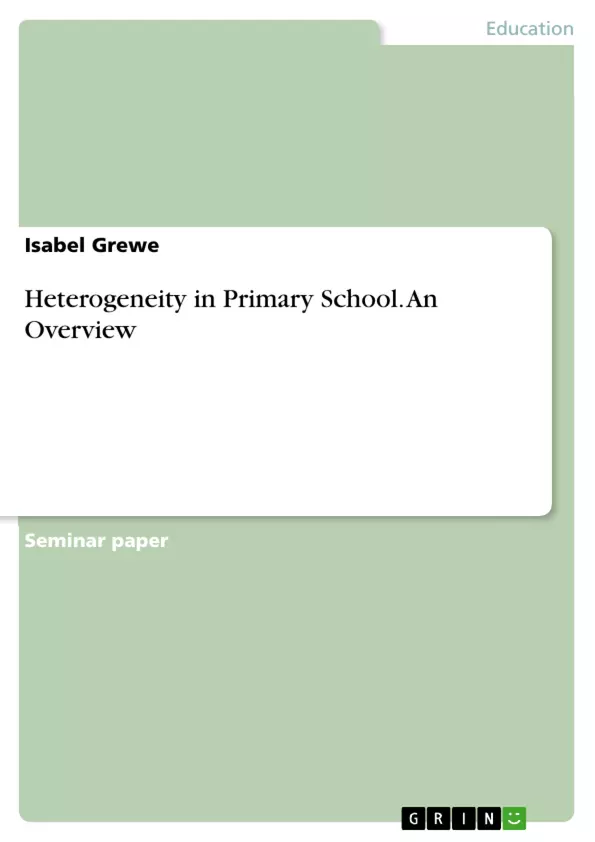This paper deals with the topic of heterogeneity among primary school children. The quote from Günther Schorch shows the problems and the topicality of the subject:
"The primary school is the type of school with the greatest heterogeneity and must cope with the special burden of a still unselected student body: From highly gifted to special needs pupils, from "high achievers" to slow learners, from socio-economically privileged to socially disadvantaged. This means that primary schools are already confronted with the perennial problem of how to deal with heterogeneity, which is difficult to solve."
The idea that children form a homogeneous learning group with the same starting conditions when they enter school has long since disappeared. So primary schools are faced with the task of providing equal education to unequal children. But what exactly is meant by the terms heterogeneity and homogeneity? In order to provide an accurate overview, I will explain the terms heterogeneity and homogeneity as an introduction. This is followed by an explanation of the many different categories of heterogeneity that can be found among primary school children. In this section, I will focus on the three largest sub-areas: Intercultural Pedagogy, Integrative Pedagogy and Feminist Pedagogy. Another part of my work deals with the different ways of dealing with heterogeneity among primary school children. Finally, the question arises as to whether heterogeneity in the classroom presents itself to the children as an opportunity or an obstacle. I would like to comment on this personally and draw on opinions from the literature.
Inhaltsverzeichnis (Table of Contents)
- Introduction
- On the concept of heterogeneity and homogeneity
- Categories of heterogeneity
- Performance-related heterogeneity
- Age heterogenicity
- Sociocultural heterogeneity
- Linguistic heterogeneity
- Health and body heterogeneity
- Gender-related heterogeneity
- Heterogeneity of family forms
- Ways of dealing with heterogeneity
- Conclusion / Open teaching as a response to heterogeneity?
Zielsetzung und Themenschwerpunkte (Objectives and Key Themes)
This work examines heterogeneity in primary school children, exploring the diverse learning needs and challenges faced by teachers in providing equal educational opportunities.
- Defining the concepts of heterogeneity and homogeneity
- Categorizing various forms of heterogeneity in primary school children
- Exploring different pedagogical approaches to address heterogeneity
- Examining the impact of heterogeneity on the learning environment
- Discussing the role of open teaching in responding to diverse learning needs.
Zusammenfassung der Kapitel (Chapter Summaries)
Chapter 1: Introduction introduces the concept of heterogeneity in primary education, highlighting the challenges of providing equal education to diverse learners. It establishes the need to understand the various forms of heterogeneity present in primary school classrooms.
Chapter 2: On the concept of heterogeneity and homogeneity provides a conceptual framework for understanding the terms heterogeneity and homogeneity, outlining how these concepts relate to the diversity of learners. It also examines the various categories of heterogeneity in primary school children, such as performance-related heterogeneity, age heterogenicity, sociocultural heterogeneity, and linguistic heterogeneity.
Chapter 3: Ways of dealing with heterogeneity delves into different approaches to address the diverse learning needs of primary school children. It explores pedagogical strategies and practices that promote inclusive learning environments and cater to individual learning styles.
Schlüsselwörter (Keywords)
The key concepts and themes of this work include: heterogeneity, homogeneity, primary education, diverse learners, inclusive pedagogy, educational challenges, open teaching, intercultural pedagogy, integrative pedagogy, and feminist pedagogy. This research focuses on understanding and addressing the diverse needs of children in primary education, promoting equitable learning opportunities for all.
Frequently Asked Questions about Heterogeneity in Primary Schools
What does heterogeneity mean in the context of primary education?
Heterogeneity refers to the diversity of students in a classroom, including differences in ability, age, sociocultural background, language, and gender.
What is the main challenge for primary schools regarding heterogeneity?
The main challenge is providing equal educational opportunities to "unequal" children, ranging from highly gifted students to those with special needs.
What are the different categories of heterogeneity mentioned?
The categories include performance-related, age-related, sociocultural, linguistic, health-related, gender-related, and family-form heterogeneity.
How can teachers deal with a heterogeneous classroom?
Teachers use various pedagogical approaches, such as Intercultural Pedagogy, Integrative Pedagogy, and "open teaching" methods to cater to individual needs.
Is heterogeneity seen as an opportunity or an obstacle?
The work discusses both views, exploring whether diversity enriches the learning environment or presents difficult-to-solve problems for educators.
- Quote paper
- Isabel Grewe (Author), 2008, Heterogeneity in Primary School. An Overview, Munich, GRIN Verlag, https://www.grin.com/document/1151628



